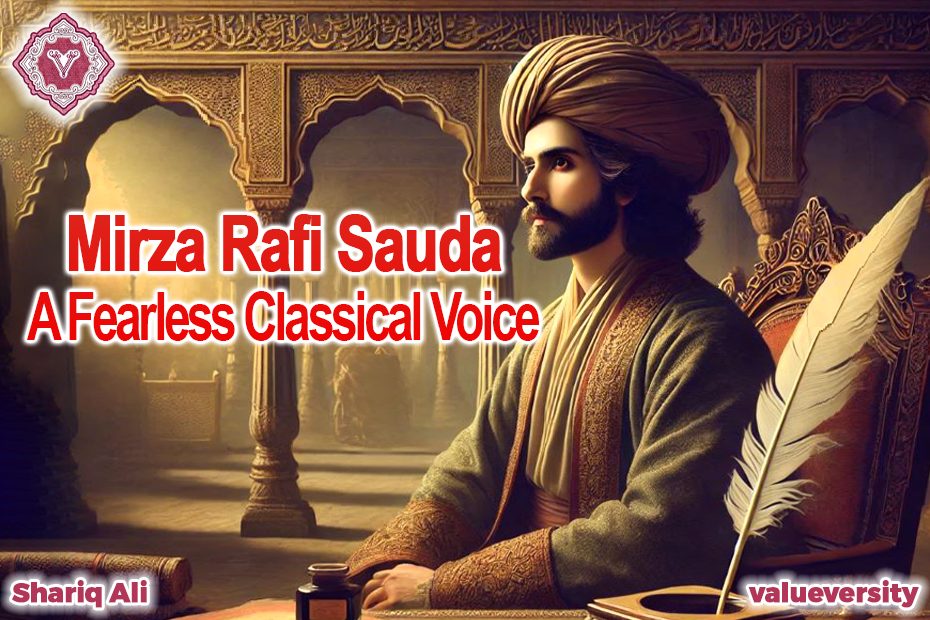Mirza Rafi Sauda: A Fearless Classical Voice
Research & Compilation:
Shariq Ali
Valueversity
When we look at the early classical pillars of Urdu poetry, the name of Mirza Rafi Sauda emerges as a bold and unique voice within the socio-political atmosphere of his time.
“عمامے کو اتار کر پڑھیو نماز شیخ
سجدے سے ورنہ سر کو اٹھایا نہ جائے گا”
Sauda is renowned not only for his fearless poetry but also for his imaginative grandeur, magnificent qasidas (panegyrics), and satirical and humorous compositions. His poetry serves as a rich chapter in Urdu literature, where individual emotions and social commentary blend seamlessly. It appears as if he not only narrated the course of history with his pen but, at times, even sought to change its direction.
Early Life and Literary Journey
Mirza Mohammad Rafi Sauda was born in 1713 in the rich intellectual and cultural environment of Delhi. At that time, Persian held scholarly dominance, and most poetry was composed in it. Initially, Sauda also experimented with Persian poetry, but on the advice of Khan Arzu, he adopted Urdu as his poetic medium. This transition gifted Urdu literature with a rare gem that significantly enhanced the beauty of the language.
Sauda spent his early poetic years in Delhi, but the political upheavals of the time forced him to migrate to Lucknow. There, he received immense respect in the court of Nawab Asaf-ud-Daulah, earning him the title of “Malik-ul-Shuara” (King of Poets). It was during this period that his poetry flourished, bringing a new dimension to Urdu literature through his satirical verses and panegyric poetry.
Characteristics of His Poetry
Sauda’s poetry spans a vast spectrum, incorporating satire, humor, deep emotions, linguistic mastery, and socio-political commentary.
His qasidas are among the earliest masterpieces of Urdu poetry, where he initially praised emperors, nobles, and ministers. However, as times changed, his pen fearlessly turned against rulers and societal flaws.
Sauda was also a master of satirical poetry. Through his sharp wit, he targeted hypocrisy, corruption, and social injustices, sometimes leading to discontent among courtiers. His migration from Delhi to Lucknow was, in part, a result of this conflict. Despite these challenges, Sauda never abandoned his bold approach. His poetry reflects a spirit of rebellion, courage, and realism.
The Emperor of Qasidas and Ghazals
Sauda’s qasidas are milestones in Urdu literature. They exude passion, powerful expression, and imaginative brilliance, setting a precedent for later poets.
He also composed ghazals, characterized by a beautiful blend of simplicity and sweetness.
Selected Verses
“جب یار نے اٹھا کر زلفوں کے بال باندھے
تب میں نے اپنے دل میں لاکھوں خیال باندھے”
“فکرِ معاش، عشقِ بتاں، یادِ رفتگاں
اس زندگی میں اب کوئی کیا کیا کرے”
“نہ کر سودا تو شکوہ ہم سے دل کی بے قراری کا
محبت کس کو دیتی ہے میاں آرام دنیا میں”
“یہ تو نہیں کہتا ہوں کہ سچ مچ کرو انصاف
جھوٹی بھی تسلی ہو تو جیتا ہی رہوں میں”
“وے صورتیں الٰہی کس ملک بستیاں ہیں
اب دیکھنے کو جن کے آنکھیں ترستیاں ہیں”
“گل پھینکے ہے اوروں کی طرف بلکہ ثمر بھی
اے خانہ برانداز چمن کچھ تو ادھر بھی”
“دل کے ٹکڑوں کو بغل گیر لیے پھرتا ہوں
کچھ علاج اس کا بھی اے شیشہ گراں ہے کہ نہیں”
“یہ تو نہیں کہتا ہوں کہ سچ مچ کرو انصاف
جھوٹی بھی تسلی ہو تو جیتا ہی رہوں میں”
“نہ جیا تیری چشم کا مارا
نہ تری زلف کا بندھا چھوٹا”
“کہیو صبا سلام ہمارا بہار سے
ہم تو چمن کو چھوڑ کے سوئے قفس چلے”
“عشق سے تو نہیں ہوں میں واقف
دل کو شعلہ سا کچھ لپٹتا ہے”
“گر ہو شراب و خلوت و محبوب خوب رو
زاہد قسم ہے تجھ کو جو تو ہو تو کیا کرے”
“گر تجھ میں ہے وفا تو جفاکار کون ہے
دل دار تو ہوا تو دل آزار کون ہے”
These verses not only showcase the beauty and depth of Sauda’s poetry but also highlight how he elegantly articulated themes of love, life, and society.
Sauda’s Literary Legacy
His “Kulliyat-e-Sauda” (Collected Works) remains a treasured masterpiece in Urdu literature, containing qasidas, ghazals, satires, and elegies. His poetry is marked by eloquence, vivid imagination, and a unique fusion of satire and humor.
The way he used his pen to address political, social, and cultural issues of his time makes his work a significant reference point in Urdu poetry.
Final Years and Lasting Influence
Sauda spent his last years in Lucknow, where he remained associated with the courts of Nawab Shuja-ud-Daulah and Nawab Asaf-ud-Daulah. However, in 1781, this legendary poet passed away, leaving behind an unparalleled literary legacy.
His poetry continues to live in the hearts of Urdu enthusiasts and will remain immortal.
Conclusion
Mirza Rafi Sauda laid the foundational stones for Urdu poetry, paving the way for future poets. He was not just a poet but a revolutionary thinker who elevated his ideas through the power of words.
Even today, when we discuss the pioneers of Urdu poetry, Sauda’s name stands tall in the classical ranks. His poetry embodies truth, courage, and imagination, qualities that will continue to inspire Urdu literature for generations to come.
